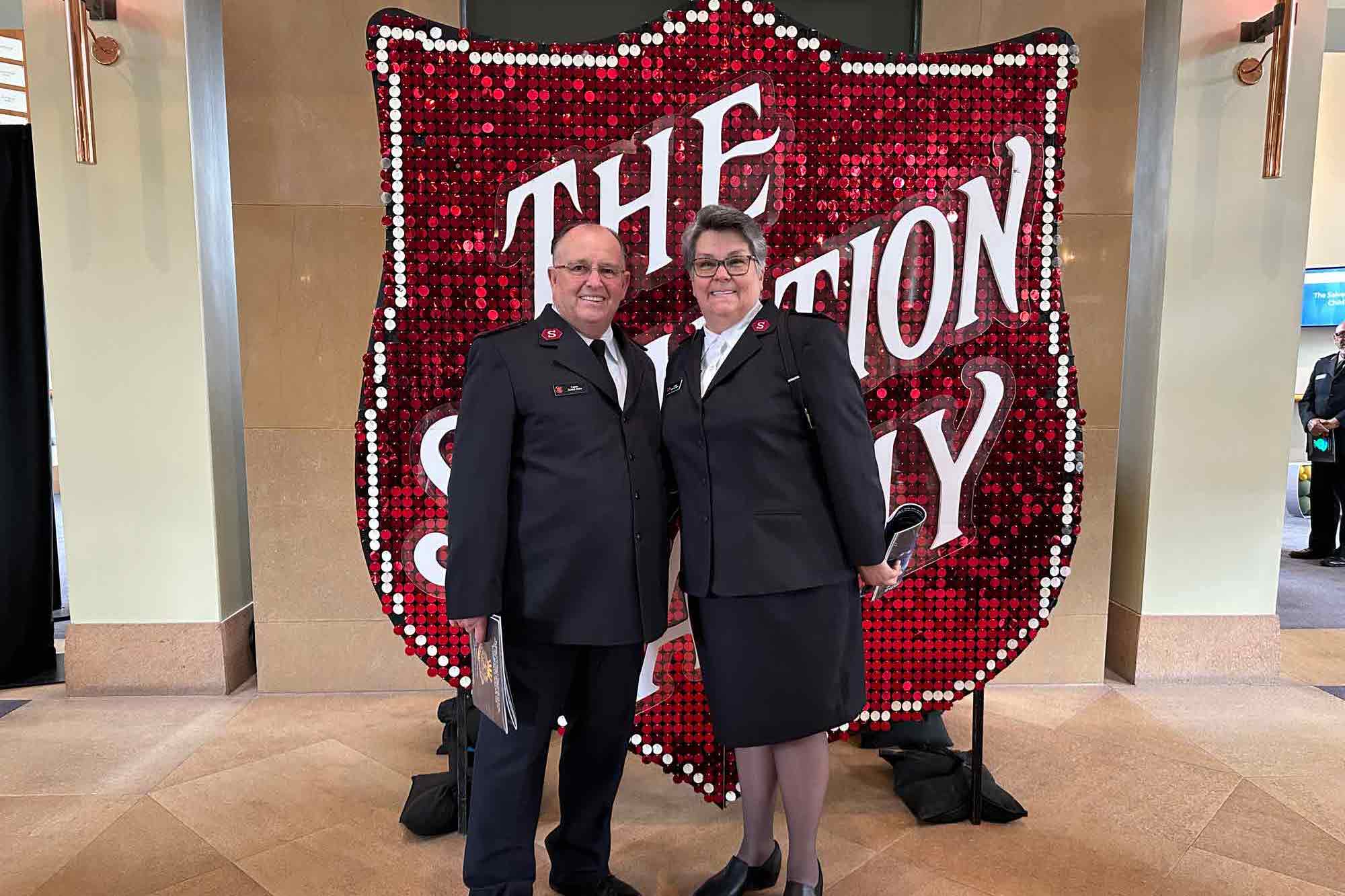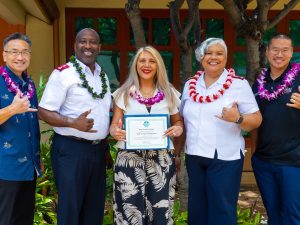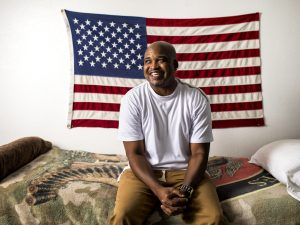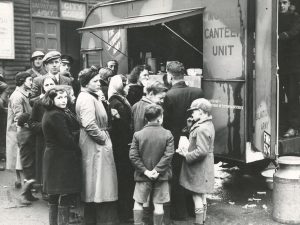Captains Edith and Rick Mabie share how they found their place in The Salvation Army.
Captain Edith Dye-Mabie and Captain Richard Mabie, Roseburg (Oregon) Corps Officers, were recently recognized by The Salvation Army Western Territory as Divine Servants—an award acknowledging individuals who reflect the selfless service of Christ in their ministry.
We connected with the Mabies to hear how they found their place in The Salvation Army.
What was your reaction to receiving the Divine Servant Award?
Rick Mabie: Amazement—we serve God. This is what we do. We get an appointment and we look out our windows and ask, “What is our ministry here in this appointment?”
Edith Dye-Mabie: We have approached each opportunity with the intention that this may be a divine appointment with higher purposes than a box of food, COVID support, or a thrift store purchase. It has brought new faces into our worship spaces and Bible studies, and offered purpose and place to some who are rebuilding their lives.
How did you first encounter The Salvation Army?
RM: It came about due to drug addiction. In 1996, I got on my knees and asked God, “If you’re real I need help.” When I opened my eyes, there were two sheriff’s officers staring me in the face, and I got arrested…When I got out, someone told me, “I know where we can go—The Salvation Army.” And like everybody else, I thought: a thrift store?
Later, I sat outside the Riverside (California) Adult Rehabilitation Center (ARC), looking at the pond and at the cross on the chapel window. And a peace came over me, like I was in the right place. They took me in and I went through the program.
And I went through the ARC Kingsmen program, just to understand who The Salvation Army is—how could they love me, when I didn’t love myself?
EDM: Rick and I had separated back in 1994. Both of us come from an addiction background; he went one way and I went another. When we reconciled in 1998, Rick was working for the ARC, driving a truck and picking up donations. And he was teaching relapse prevention.
I started attending chapel at the Riverside ARC in 2000 off and on, then solid weekly attendance in late 2002.
I didn’t always go to chapel there…God just has a way of continuing to knock on the door until you actually open it. The officers there were kind—even to the most vile. They knew my name, our story, and they loved us anyway. They made me feel included and valued.
How did you find your place in The Salvation Army?
EDM: The Riverside ARC was a men’s facility. The focus there is on sobriety and the spiritual growth of the beneficiaries—not wives and children. We were looking for a place to worship as a family. Eventually, I told Rick, “I’m not into this church-hopping thing, When you decide where you can plant yourself then I’ll think about it.” He planted himself in Murrieta [the newly established Murrieta Corps]. And I said I’d check it out and we’ll see what happens. It has to be a fit for us.
The Trimmers [then Captains Darren and LeAnn Trimmer] were a fit. What they said at the pulpit is exactly how they live their life. They were genuine.
RM: When I first went to Murrieta, it was just me and my daughter and 30 retired officers. Then the Trimmers became corps officers. And they looked at us and I looked at them…you could feel something was going to happen. They had never served in the ARC. I told them I wanted to bring a van to the Riverside ARC and bring guys to church. So I did. And it just exploded. The guys came with their families. What happened there? You can’t script it. It was just God.
Captain Edith, you volunteered at the Murrieta Corps. How did that impact you?
EDM: I helped pack toy bags at Christmas, shredded old files in the social service office and helped organize the supply room. I really appreciated that coming out of my addiction, I still had value; I still had skills. Because you think there are some you might have just thrown away. In truth, they were still there. I just wasn’t using them.
Then finding that place, a safe place to be valued, where it didn’t matter if I had the right attire or not or my words were not always as refined as they could have been—coming out of my addiction, that was really important. I felt like I belonged. I never felt out of place. And it was very satisfying, very encouraging to me to be able to help other people find out that they could belong, too: the guys that would come from the ARC to worship, their girlfriends, their wives, their children—and for them to be able to find out that you’re welcome here, even in maybe a disheveled state, whether it’s mentally or materialistically.
How did you decide to become Salvation Army officers?
RM: My wife and I were sitting at home one Saturday, thinking something’s missing. I was Corps Sergeant-Major; my wife was Corps Secretary. And I had my job. I made good money. I was 53 years old. I wasn’t thinking about officership. I thought the cut-off was 50. And then my Corps Officer said, “Just go to this Future Officers’ Fellowship. Just put your foot in the door.”
I thought it’s not supposed to be…but in three months, we were in the training college.
EDM: Rick and I are both older; I thought there’s no way…Every obstacle that popped up had already been taken care of. Doors just flew open.
What do you love most about The Salvation Army?
EDM: When I began attending Murrieta, I sat in the back row. Wore cutoff shorts, t-shirts and flip flops. They loved me anyway…All they worried about was we want you here with us. You are welcome here. You just don’t find that kind of acceptance just anywhere.
RM: We’re not a sit-down church. I mean, we’re not a mega church. But we are a mega church—we’re in 133 countries. I look at us as missionaries in the United States.
We go and serve the community. And we do that wherever we go. We go somewhere, discover the need and try to fulfill that. That’s what I love about going to each appointment and asking, “Why did God bring us here?”
EDM: Coming out of addiction, your expectations are always for so much less. You think, because of what I’ve done, my life is going to be less. And in truth, following Jesus was the best decision I ever made. And life is really so much more.
RM: We show the love we were shown.
Do Good:
- Do you enjoy inspiring stories of impact that build well-being for all? Want to know how to get involved in doing good right where you are? Interested in tools for taking your next best step, owning your story and stepping into your calling? Like reminders that God is good, faithful and offers you joy and peace? Get the Do Good Digest and find weekly inspiration right inside your inbox.
- Subscribe to the Do Gooders Podcast and tune in for good ideas. Get inspiration from the experts on how to do good and find meaning along the way—and join thousands in making an impact for good right where you are.
- Read how one Adult Rehabilitation Program graduate now pays it forward.












